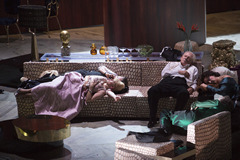| Opera Reviews | 26 April 2024 |
A compelling world premiereby Silvia Luraghi |
|
| Adès: The Exterminating Angel Salzburg Festival 8 August 2016 |
|
|
Adès said that he had been thinking of an opera based on Buñuel’s work for a long time, as he felt inspired by its surrealistic character. He collaborated with librettist Tom Cairns, who followed Buñuel’s film quite strictly, though he cut down on the number of principals (but the cast remains numerous, with 15 principals and various side roles). Both the composer and librettist had an active role in the performance, one in the pit, as conductor of the ORF Radio Symphony Orchestra, and the other as stage director, relying on collaboration with set and costume designer Hildegard Bechtler, lighting designer Jon Clark and choreographer Amir Hosseinpour. Bells toll before the lights go out and the performance starts. On the partly dark stage one can already see some live sheep grazing calmly outside an indoor set, while a domesticated bear shortly appears. When the opera starts, Lucia de Nobile (Amanda Echalaz) and her husband Edmundo (Charles Workman), a bourgeois couple, enter the dining room of their villa with a group of guests. They have attended an opera performance and have invited some members of the cast: the prima donna Leticia Maynar, and conductor Alberto Roc (Thomas Allen) with his wife, renowned pianist Blanca Delgado (Christine Rice). Outside the room, the servants decide to run away, leaving only the butler to serve dinner. The guests entertain themselves with small talk typical of such social occasions, but at the end of the dinner they are unable to leave the room. They all spend the night on the sofas of Nobile’s villa, and when in the morning they realize that they are unable to leave with no apparent reason, the atmosphere grows increasingly unpleasant. A second night comes, during which the elderly Señor Russel (Sten Byel) dies, assisted by doctor Carlos Conde (John Tomlinson). As no supplies have been brought in, the next morning the guests slaughter the sheep and roast them. The bear appears again, first projected on the background, then wandering around at the door of the dining room. In the meantime, people have gathered outside the villa, but in much the same way as the guests cannot go out, nobody from outside can go in. Finally, Leticia realizes that the course of events could have been changed if she had accepted to sing: accordingly, she does so, accompanied by Blanca and the spell is broken. The guests are now able to leave the house, and meet the people who have been waiting outside (this is a change from the original plot of the movie, in which the guests move to a nearby church to give thanks for their salvation, just to realize that they are now trapped in the church). Adès’ music is very eloquent in defining the different situations, with the vocal score involving coloratura and melodic sections, as in Silvia’s aria (touchingly sung by soprano Sally Matthews). The orchestration is rich and interesting, and on the whole the production is quite compelling. The often critical, and quite traditional, audience of the House for Mozart visibly liked the music and the performance: this should be a good omen for upcoming revivals.
|
|
| Text ©
Silvia Luraghi Photo © Salzburger Festspiele / Monika Rittershaus |

 Even though it doesn’t have a score, Luis Buñuel’s movie The Exterminating Angel (El angel exterminador) has a decidedly operatic side, according to British composer Thomas Adès, whose new opera with the same name has received its world premiere at this year's Salzburg Festival, in a co-production with the Royal Opera, Metropolitan Opera and Den Kongelige Opera.
Even though it doesn’t have a score, Luis Buñuel’s movie The Exterminating Angel (El angel exterminador) has a decidedly operatic side, according to British composer Thomas Adès, whose new opera with the same name has received its world premiere at this year's Salzburg Festival, in a co-production with the Royal Opera, Metropolitan Opera and Den Kongelige Opera.





